
Disclosure: This article may contain affiliate links, which means if you click on some links, we may earn a commission and no additional cost to you.
If you want to start a blog, then you gonna need a blogging platform. But with so many blogging platforms out there, which one is best for you?
Most platforms that are in the market right now are great for blogging, but not every one of them is gonna fit your needs.
Some may hurt your budget, take time to learn, and limited monetization capabilities.
So in this article, I will share with you the most popular blogging platforms and help you choose the right one that fits your needs.
What is a blogging platform?
A blogging platform is software that allows you to write and manage content. It is also referred to as a content management system (CMS).
Most blogging platforms allow you to create blogging websites with a high level of customization.
But there are also blogging platforms that work like a social networking site and let you start writing by just signing up on their platform. And without having the hard work of designing and building a blog site.
How to choose a blogging platform
And because not all platforms will fit your needs, here are the things to look for when choosing a blogging platform.
Ease of use
Every blogging platform has a different interface. So look for a platform that is beginner-friendly and has large support from communities.
It’s best that a blogging platform already has a great number of users, which means that a lot of bloggers love the platform.
You may check reviews from review websites such as Trustpilot to see how real people experience using different platforms.
Most blogging platforms are free and some are paid. But most paid platforms offer a 14-day free trial.
So It’s best that you try different platforms yourself, and decide if it’s something you would like to work on.
Customizations
Do you want a unique blogging site that looks totally different from the rest?
Do you want other users to access and edit your content?
Do you want to make money from your blogs? Or you just simply wanted to write, and that’s it?
Keep in mind that blogging platforms have different levels of customization. One may be able to do this feature, but not the other.
And starting a blog on the wrong platform may also make it hard for you to migrate to another. So it’s best to consider what your blogging goals are gonna be.
Cost
Most blogging platforms are free, and some are paid but are offering a free trial.
This is a great option for aspiring bloggers because you get to try the platform without cost before you commit to the long term.
And because it’s free, most free plans offer only basic features and with very limited customization.
But if you prefer a blogging platform with higher customizations, then you need to invest in domain name, web hosting, or upgrade to a higher tier plan.
Best blogging platforms for beginners
Now that you know what to look for when choosing a blogging platform, here are my top 5 best blogging platforms for beginners.
WordPress.org
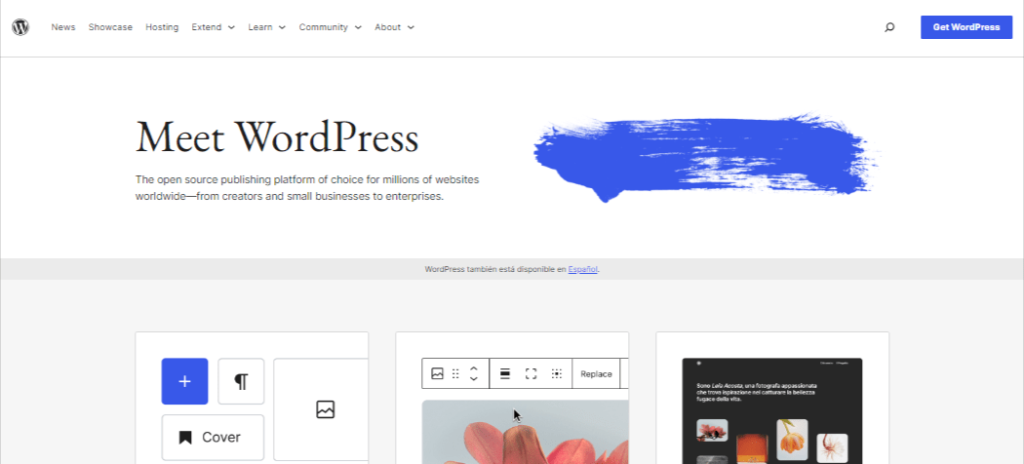
WordPress is the most popular CMS. In fact, WordPress powers over 42% of all websites in the world.
But keep in mind that WordPress.org is different from WordPress.com.
Both are totally different platforms, and WordPress.com has its own entry list below.
WordPress.org is the most popular choice among many bloggers because it offers a high level of customizations, thousands of third-party plugin integrations, and a large community of users ready to support you in case you need help with your WordPress website.
What’s great about WordPress.org is that you can build just any website using this platform. From personal, company, and ecommerce, to blogging websites, you name it, WordPress can do all of that.
And most of my websites are built on WordPress.org.
Even this blog site that you are currently reading is built on WordPress.
The only problem with WordPress is that it’s not the most beginner-friendly.
But if you spend time learning how to use this blogging platform, then the sky’s the limit on what you can build here.
Pros
- Drag and drop capabilities (no coding needed)
- Highly customizable
- Thousands of themes and plugins to choose from
- Unlimited monetization capabilities
- Large community support
Cons
- Not the most beginner-friendly
- It’s a self-hosted. This means you are responsible for web hosting and maintaining your site
Price
WordPress is free to use. However, you need to install WordPress first before you can use it.
But it’s not as complicated as you may think. I’ve created a step-by-step guide on how to start a WordPress blog for beginners.
And it needs an initial investment for web hosting and domain name starting only at $3/month on web hosting companies like Hostinger.
WordPress.com
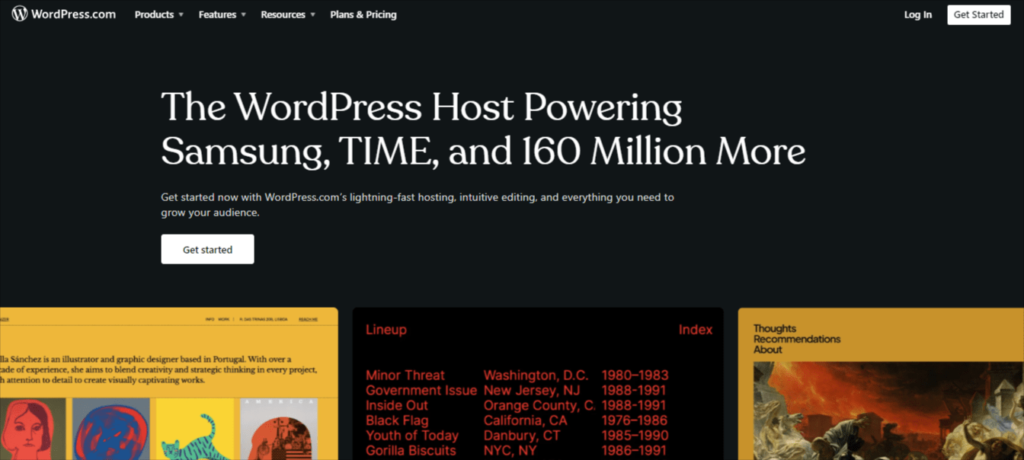
WordPress.com is a great alternative to its sibling, WordPress.org. It’s beginner-friendly and you get to access everything in one place, including a CMS, web hosting, and domain name.
The only problem with this version of WordPress is that it lacks access to the thousands of plugins that are only available on WordPress.org.
Pros
- Easy to set up
- Drag and drop capabilities (no coding needed)
- WordPress.com takes care of web hosting and maintenance (updates and backups)
Cons
- Limited access to third-party plugins that are only available on WordPress.org
- You need to stick with the platform’s guidelines, or your blog may be at risk of suspension.
Cost
The basic account on WordPress is free with a subdomain like https://yourblog.wordpress.com.
However, WordPress displays ads on your blogs (without compensating you) on their free account.
To get rid of ads and have a custom domain like https://yourblog.com, you may need to consider upgrading to their higher tier plans that start at $35/month billed yearly.
Medium
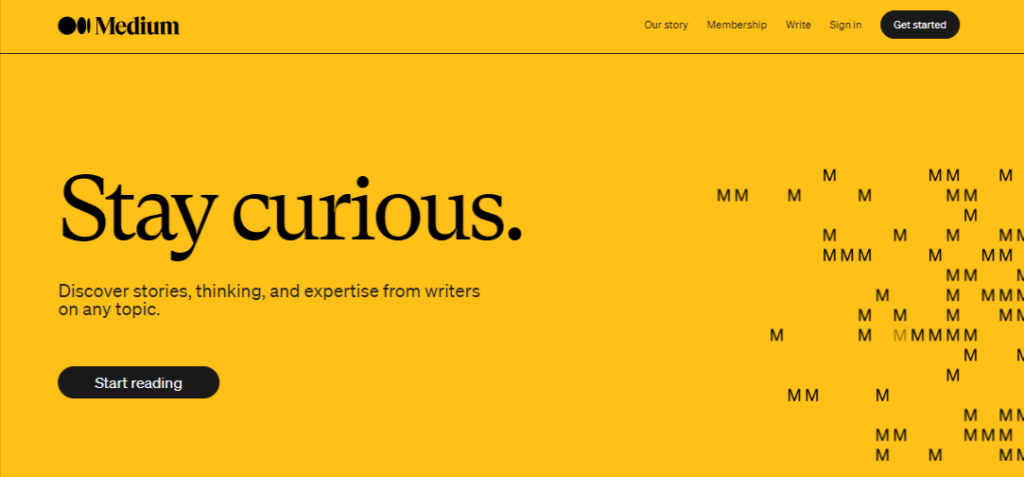
Medium is great for bloggers who want to start writing right away. And it works like a social networking site.
You just simply need to sign up, create a profile, and start writing content.
Most bloggers use Medium just to try a niche, and see if it’s something they will be committed to, before investing more time and money on other robust platforms such as WordPress.
Plus, writing for Medium gets your blog exposure to over 100 million active users.
Pros
- It’s free
- Very easy to use and just need to create an account
- Exposure to Medium’s built-in audience
Cons
- Limited customizations
- High level of competition
- Limited ways to make money blogging
Cost
Medium is free to use.
Blogger
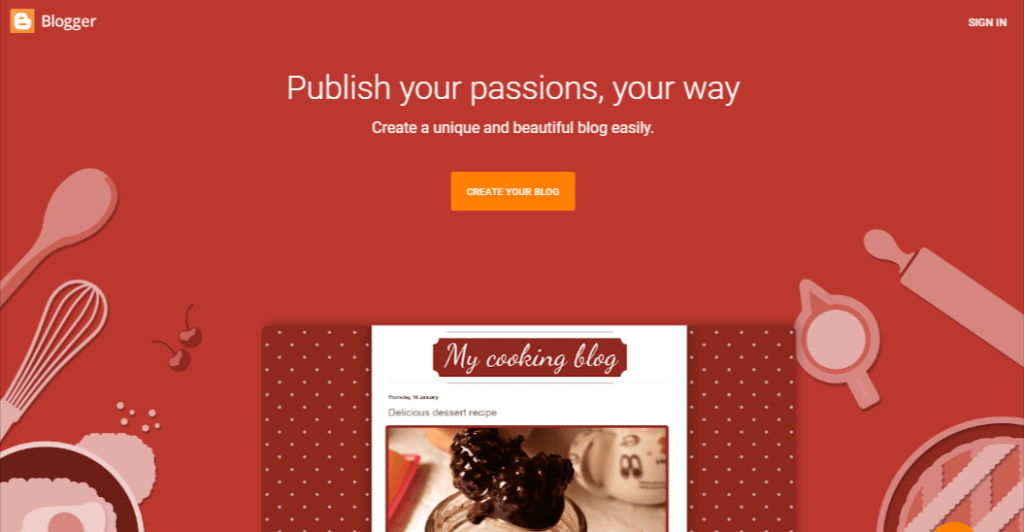
Blogger is a free blogging platform by Google. And you just need a Google account to use it.
Blogger is easy to use. And works seamlessly and integrates with most of Google products including Google AdSense.
AdSense is an ad network by Google that lets you earn money on your blogs. However, Blogger has limited customization when it comes to design and features.
But if you just want a simple blogging platform that has strong security which Google provides, then Blogger may work for you.
Pros
- It’s free
- User-friendly interface
- Strong security
- Monetization is available with Google AdSense
Cons
- Limited customizations
- Google may suspend your account if you don’t follow their guidelines and may lose all your work.
Cost
Blogger is free to use. However, your free subdomain will look something like https://yourblog.blogspot.com
But if you want to have a custom domain like https://yourblog.com to make it look more professional, then you need to purchase through a third-party domain registrar like Hostinger.
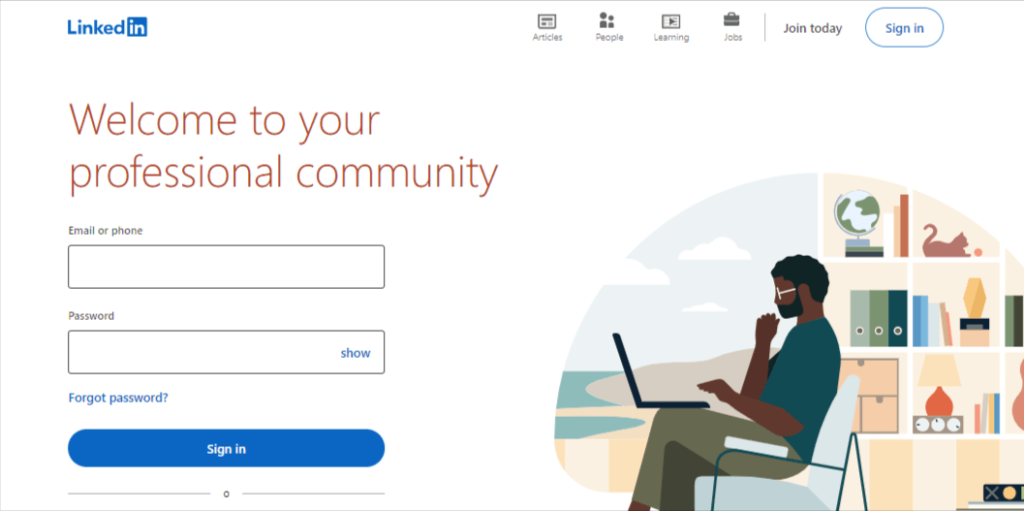
LinkedIn may seem like only a social networking site, but there’s more to it.
Most users on LinkedIn are seeking and recruiting jobs, but some users use the platform for blogging.
Blogging on LinkedIn helps establish expertise and may attract leads and freelance writing opportunities on the platform.
Plus, you get access to over 1 billion audiences on LinkedIn worldwide.
Pros
- It’s free to use
- No technical skills needed
- Access to the platform’s large audience
Cons
- Limited customizations
- Limited ways to make money blogging
Cost
LinkedIn is free. You just need to create an account and start writing.
FAQs
Below are the frequently asked questions about the best blogging platforms for beginners.
Which blogging platform is easiest for beginners?
The easiest blogging platform to start is Medium and LinkedIn.
You just need to sign up, create a profile, and start writing.
Can I switch blogging platforms later if I need to?
Most blogging platforms can easily be migrated to another.
But it’s best to do a quick Google search if your chosen blogging platform allows you to, or else, you will be starting all over again from another platform.
Are blogging platforms free to use?
Most blogging platforms are free. And some are paid but offer a 14-day free trial.
Is blogging still worth it?
Yes, it is. As long as people are searching on the web, blogs will still be relevant.
What is the best blogging platform to make money?
The best blogging platform to make money is WordPress.org. It is highly customizable and can be monetized in different ways.
Final thoughts
One platform may suit the other, but won’t necessarily work for you.
Carefully consider each platform for its ease of use, customization, and cost.
If you are just looking for a platform that is simple to use, then Medium and LinkedIn will be a good start.
But if you want to make money blogging, then I highly recommend you choose WordPress.org and start learning how to use the platform.
And if you are considering starting a blog on WordPress.org, then check out my tutorial on how to start a WordPress blog for beginners.
Which blogging platform is your go-to and why? Let me know in the comments below.
Featured image credit: Burst
I’m a certified faulty blogger, proactively learning how to become a better blogger and sharing these insights with you here at FaultyBlogger. I also write entrepreneurship on my personal blog.


